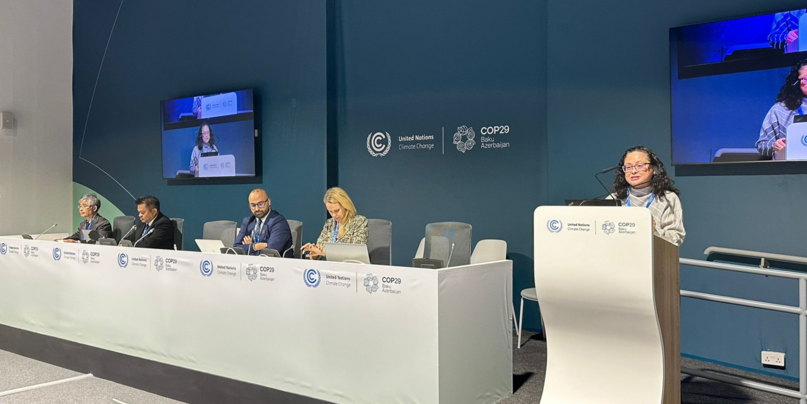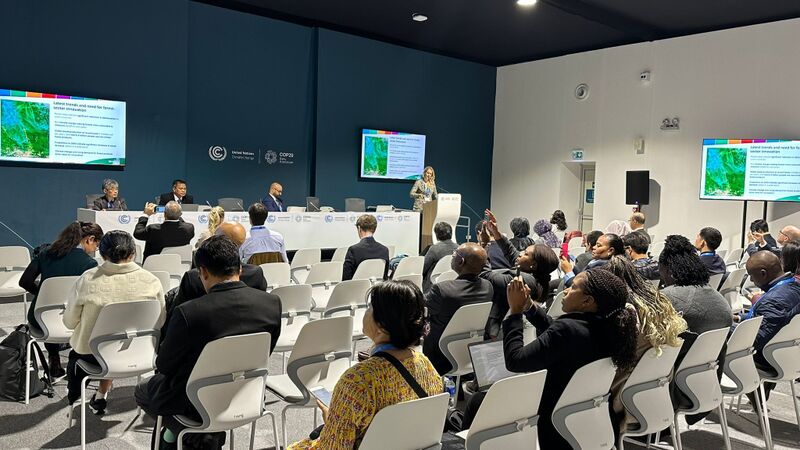Innovations in sustainable forestry―crucial in the fight against climate change
15 November 2024

Ms Jennifer Conje, ITTO Director of Forest Management, speaking at a side-event held on 12 November 2024 during the 29th meeting of the Conference of the Parties to the United Nations Framework Convention on Climate Change (UNFCC COP 29). Photo credit: ITTO
Baku, Azerbaijan, 15 November 2024: The use of new technologies, methodologies, ways of thinking, processes and partnerships in sustainable forestry are fundamental tools for increasing resilience and combat the adverse effects of climate change, according to experts at a side-event at the United Nations Climate Convention underway in Azerbaijan.
The side-event held on 12 November 2024 during the 29th meeting of the Conference of the Parties to the United Nations Framework Convention on Climate Change (UNFCC COP 29) was co-organized by ITTO and Japan’s Forestry and Forest Products Research Institute (FFPRI) under the theme “Innovations to maximize tropical forests’ contribution to climate-change mitigation and adaptation”.
In her opening remarks Ms Jennifer Conje ITTO Director of Forest Management mentioned that one of the most defining characteristics of the first quarter of the 21st century is the pace of innovation and how it has fundamentally changed the daily lives of people. “One cannot deny that innovation is an increasingly fundamental tool to assess risks and threats, contribute to mitigation efforts, and help countries and communities plan for resiliency in the face of climate change”, she said.
Amy Duchelle, Team Leader Forest and Climate at the Food and Agriculture Organization of the United Nations presented on the 2024 State of the World’s Forest (SOFO) report which focused on innovations in the forest sector. The report showcases the transformative power of evidence-based innovation in the sector, ranging from new technologies, successful policies, institutional changes and new ways for financing forest owners and managers, pointing out that combinations (“bundles”) of these innovation types can unleash powerful forces for change. She presented sample case studies on how innovation bolstered forest restoration and expanded agroforestry; and promoted sustainable use and built green value chains.
Thomas Nifinluri, Director, Forest and Land Fire Management, Director General of Climate Change at Indonesia’s Ministry of Environment and Forests, noted that Indonesia is one of the most vulnerable countries to climate change and that wildfires need to be closely monitored in the face of increasing temperatures. He showcased an Indonesian ITTO project which included the development of an integrated patrol reporting app and fostered cooperation among local institutions, private sector and communities for fire prevention. The project also promoted an innovative practice for agricultural land preparation without burning―which was awarded 1st prize at the International Climate Competition-Green Eurasia 2024 in the category of sustainable land use, forestry and water management.
FFPRI’s Dr Koji Tamai, Director of REDD Plus and Forest Disaster Risk Reduction Research Centre presented on risk reduction of landslides in forested landscapes, highlighting successful experiences in Japan where forests significantly reduced human losses in landslides since the 1960’s. As extreme weather events become more frequent, risk mapping along with artificial intelligence and ground surveys has become a useful tool for improving disaster risk reduction, which Mr Tamai illustrated through a FFPRI initiative in Viet Nam.
Dr El Khalil Cherif from MARETEC/LARSyS, University of Lisboa, presented a study on mapping shrub cover to predict wildfires and protect forest. The study was motivated by the increasing number of wildfires in Portugal with negative impacts on people and the environment. The study aims to better prevent and combat forest fires utilizing remote sensing and satellite images to map shrub risk areas and predict fire hazards. Mr Cherif concluded that this methodology combined with other data such as weather patterns, topography and historical fire occurrences can facilitate the development of comprehensive risk assessments models.
ITTO’s Projects Manager Ramon Carrillo introduced innovations that have taken place in Guatemala over the last decade in the forest sector which gave birth to the country’s timber tracking system. The system has automated forest-related processes, minimized response times, standardized forms, clarified procedures, avoided data duplication, minimized human error, limited officers’ discretionary powers and bureaucracy, and met the deadlines established by law to process requests and applications. The latest addition is an app to quickly and accurately assess the volume of logs and other wood products in transit, requiring only a photograph and a few simple measurements. The app, called “CUBIFOR” is advancing forest management and strengthening the capacity of forest companies in Guatemala to control their inventories and improve efficiency of all activities requiring the quantification of timber volumes, thus boosting legal and sustainable forest supply chains. The app is also featured in the SOFO report.
In summarizing the event, Ms Conje quoted Charles Darwin stating that “it is not the strongest of the species that survive, nor the most intelligent, but the one most responsive to change.” She noted that innovation is one the biggest factors that drive change; and encouraged that these types of innovations need to be effectively communicated to industry, governments, and society to ensure that emerging science/innovations can successfully contribute to climate adaptation and mitigation efforts.

Participants at the side-event, “Innovations to maximize tropical forests’ contribution to climate-change mitigation and adaptation” on 12 November 2024 during the 29th meeting of the Conference of the Parties to the United Nations Framework Convention on Climate Change (UNFCC COP 29). Photo credit: ITTO
Download ITTO’s presentations below.